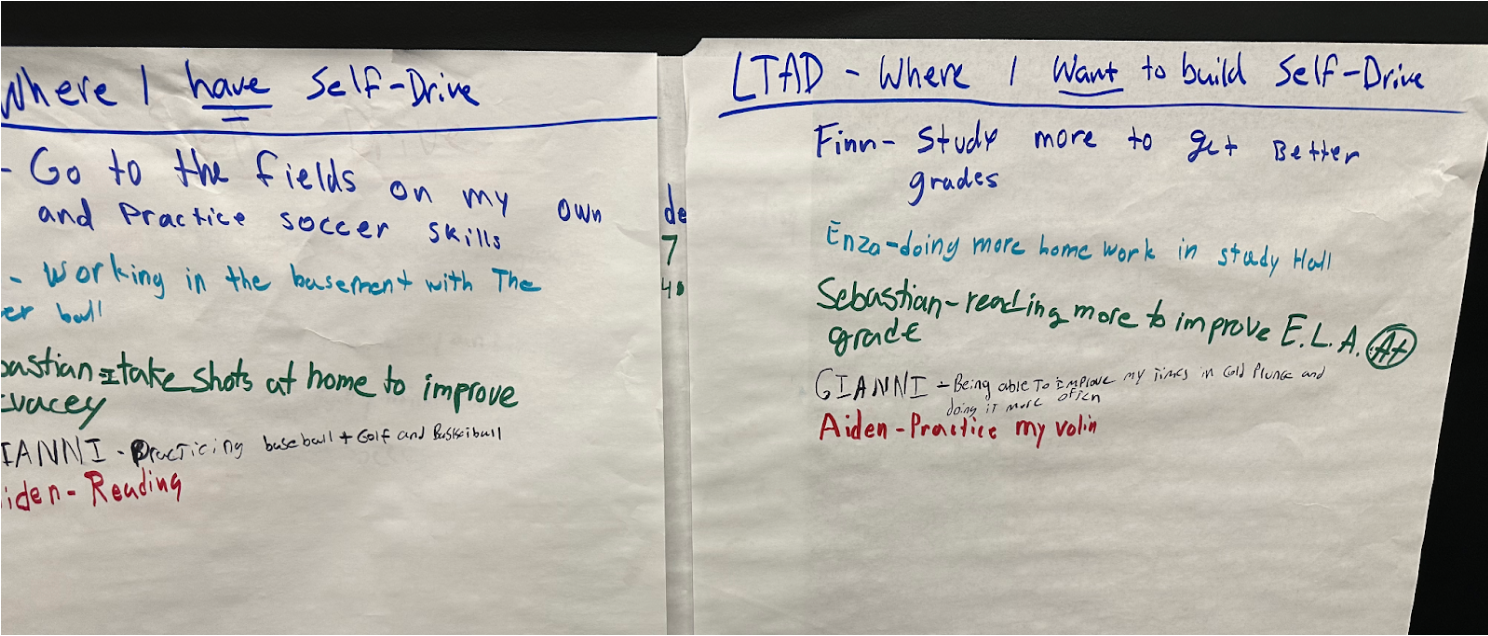Developing Young Leaders: Self-Drive: The Root to Accomplishing Anything
November 8, 2024
Self-Drive: The Root to Accomplishing Anything

Self-Drive is a Trainable Skill
The first time I heard that self-drive is a trainable skill, I had to pause for a second. I had never really thought about it that way. I always assumed I had self-drive for the things I enjoyed or was naturally good at—it didn't seem like a skill, it just felt natural.
But the more I thought about the areas in my life where I exhibit self-drive, the more I started to see the habits and rituals I built around improving at those things. Once I understood that, the next step was figuring out how to apply those same principles to areas in my life where I wanted to develop self-drive.
This is what we’re working on with the LTAD group this week. The first step for them was to identify where they already have self-drive. Here are some of the areas the kids shared:
Where I have Self-Drive
- "Going to the field to practice soccer on my own."
- "Working in the basement with the soccer ball."
- "Taking shots at home to improve my accuracy."
- "Practicing baseball, golf, and basketball."
- "Reading."
These answers didn't come out immediately. Before we started the workout, I asked them to think about things they felt driven to do. At first, they listed tasks they felt they had to do, like homework or cleaning their room.
This highlighted an important aspect of self-drive: it has to come from within. Self-drive isn’t about doing something just to please your parents or avoid getting in trouble—it’s about something you’re motivated to do for yourself. This doesn't mean they shouldn’t do tasks like homework, but understanding the root of their self-drive is key to replicating it across different areas of their lives.
After we discussed this and went through the workout, the kids were able to identify the areas where they truly felt self-driven, and those are the examples they shared above.
Before we started breaking down their habits and rituals around their self-driven skills, I asked them another question: "What is something you would like to have self-drive in?"
Where I want to build Self-Drive
- “Study more to get better grades”
- “Doing more homework in study hall”
- “Reading more to improve E.L.A (A+)”
- “Being able to improve my time in the cold plunge and do it more often”
- “Pratice my volin”
My belief is that by helping them see the gap between the areas where they have self-drive and where they don’t, it will become easier for them to identify the habits that drive them and apply those same habits to other skills they want to improve.

Next week, we'll work on identifying the fears and frustrations that can prevent them from developing these skills.
Previous Blogs

Enzo is a standout part of the Prototype community—supportive, determined, and a pleasure to be around. His commitment to consistency, camaraderie, and long-term progress makes him a perfect example of what PTS is all about. Below he answers some questions and shares his experience. Share your experience at Prototype—favorite memories, moments, or stories or what’s your favorite part/what do you look forward to? When I first went to the gym, coming from the Nike camps, being at a real gym was a great experience. The coaches were all excellent and helped with my growth. Who at Prototype has made the biggest impact on you and why? Steve Cimino - has coached me 1 on 1 and continues to build out my program at the gym. What are your hobbies and activities outside the gym? Soccer, and more soccer. I also ski in the winter. How has Prototype helped you or solved a problem for you? It has made me better for sports for overall speed and strength, this translates to my soccer programs. What are your current fitness goals? To get faster on the soccer field. Favorite Quote No quote, but I like movies.

Sharang is a standout part of the Prototype community—steady, positive, and always putting in the work—and his commitment to consistency, camaraderie, and long-term progress makes him a perfect example of what PTS is all about. Below he answers some questions and shares his experience. Share your experience at Prototype—favorite memories, moments, or stories or what’s your favorite part/what do you look forward to? What stands out most about Prototype is the camaraderie. The members, especially in the 7AM and Noon classes, create a great balance of fun and focus. Everyone is friendly and supportive, but when it’s time to work, people take the WODs seriously and push themselves to improve. That combination can be hard to find. All the coaches play a huge role in setting that tone. My favorite moments are the everyday ones i.e. showing up, putting in the work together, leaving class feeling accomplished. What I look forward to most is continuing to train alongside people who genuinely enjoy the process and want to get better. “Because summer’s coming.” Who at Prototype has made the biggest impact on you and why? As a dad of two young daughters, the people who’ve made the biggest impact on me at Prototype are the women in the gym. They all train with confidence, strength, consistency and set a powerful example. It’s the kind of environment I hope my daughters grow up seeing where strength is normal and earned. What are your hobbies and activities outside the gym? I dabble a bit in photography, star gazing and love to travel. Playing atrocious golf. How has Prototype helped you or solved a problem for you? Prototype has helped me stay active. There’s a real sense of happiness and accomplishment after each workout, and that feeling has become addictive in the best way. Knowing I’ll leave class feeling stronger, physically and mentally, keeps me coming back. Prototype has turned working out from something I should do into something I genuinely want to do, which has made a huge difference in maintaining a sustainable fitness routine. What are your current fitness goals? Steady progress and longevity. If I can keep lifting, moving well, and feeling good years from now, I’ll consider that a win. I hope my future self will thank my present self. Favorite Quote If you can’t explain it simply you don't understand it well enough.
Climb to New Heights
Prototype Training Systems is more than a gym - it is a lifestyle. Join us today!


